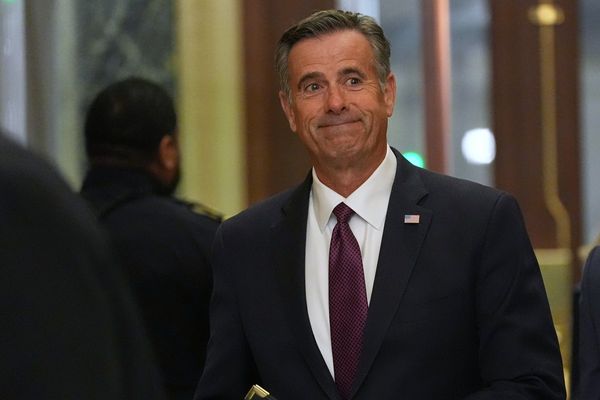
The embarrassing rout of Russian forces in northeastern Ukraine has sparked some embarrassing – and shocking – moments on Russian TV as the media grapples with covering battlefield losses without earning the Kremlin’s ire.
On September 11, the prime-time Sunday talk show on Russia’s NTV featured an extraordinary on-air exchange that promptly caught the attention of Russian media monitors across the world.
As a TV host on the Gazprom-owned channel attempted to moderate a debate between eight panelists, the views expressed on-air appeared to be slipping out of his control.
“We’re now at the point when we have to understand this: It’s absolutely impossible to defeat Ukraine using the resources and colonial war methods with which Russia is trying to wage war,” said Boris Nadezhdin, a former Russian lawmaker, in a shocking public criticism of what Russia still calls a “special military operation”.
As Ukrainian forces recaptured terrain in the northeastern Kharkiv region this month in a lightning counter-offensive, the Moscow media machinery was caught off-guard on live TV.
Russian media had studiously avoided mention of the gains the Ukrainian military has been making for weeks. But on Saturday, when Russia abandoned its main bastion in the northeastern region, marking its worst defeat since the early days of the invasion, the embarrassing reversal was too big to ignore. “They really didn’t expect this. They didn’t know what to say and they didn’t receive information from the Kremlin on how to react,” explained Alexandra Filippenko, a Russian political scientist now based in Lithuania, on FRANCE 24’s “The Debate” show on Monday.
Since Russia launched its invasion in Ukraine on February 24, Russian media pundits have strenuously backed the “special military operation”, with commentators trying to outdo each other in their support for President Vladimir Putin.
On Sunday night, there were still displays of the old rhetoric on the NTV talk show following Nadezhdin’s stunning takedown of Russian military strategy. “Non-comrade Nadezhdin, I again urge you to watch your language when you talk about ‘colonial wars’, even in passing,” warned parliamentarian Alexander Kazakov.
But Kazakov’s warning sounded more defensive than fiery when he went on to explain that Russia was actually taking on the West in the “broader theatre of war”. “A global war is under way, this is just a fragment of it,” he said before Nadezhdin shot back, “I hope a global war doesn’t start. But if it does, the balance of power won’t be in our favour.”
A rout turns ‘strategic withdrawal’
The feisty on-air exchanges were a departure from the rabble-rousing seen on Russian TV stations over the past few months. Even the Kremlin’s most vociferous defender, Dmitry Kiselyov – dubbed “Putin’s mouthpiece” – was forced to adopt a sombre tone on his prime-time Sunday night show on the state-run Russia-1 network.
"A most difficult week on the front," admitted Kiselyov, opening his show. Under a studio backdrop that proclaimed, “Regrouping”, Kiselyov admitted Russian forces had abandoned “previously liberated settlements".
Kiselyov’s discourse on its losses in Ukraine’s eastern Donbas region mirrored Moscow’s talking points following the Russian pullout in late March from the Kyiv region after the assault on the Ukrainian capital was ground down by fierce resistance.
"They generally use euphemisms to minimise the importance of what is happening and suggest that everything is going as planned," explained Maxim Alyukov, a Russian media specialist at King's College London, in an interview with FRANCE 24.
TV stations and newspapers talk about a "strategic withdrawal to help defend the Donbas, which is reminiscent of the way the failure to take Kyiv was justified at the beginning of the war", said Jaroslava Barbieri, a specialist on Russia at the University of Birmingham.
The idea of a carefully planned "strategic withdrawal" was taken up by Russian print media and wire services even as they acknowledge that Russian troops have been pushed back by Ukrainian forces.
The RIA Novosti news agency, for instance, said Russian troops were forced to retreat since the Ukrainians were much more numerous due to the contribution of "foreign mercenaries". At the same time, RIA Novosti was also busy reporting a planned “strategic withdrawal” from the Kharkiv region.
"The Russian media, which is subservient to the government, has started to use several contradictory explanations at the same time. This is in line with their traditional propaganda strategy, which is not to inform but to confuse," explained Vera Tolz, a Russian media specialist at the University of Manchester.
Blame the separatist republics, not Moscow
While the lightning Ukrainian gains caught Russian media outlets by surprise, the editorial line in several newsrooms quickly fell back on standard operating procedures in the face of the unexpected and unforeseen.
From the Lithuanian capital of Vilnius, where she was monitoring the Sunday prime-time shows, Filippenko noticed a new trend.
On Channel One, Russia’s oldest and largest state-controlled TV station, Filippenko noted that the battlefield setbacks were being pinned on Donetsk and Luhansk, parts of the eastern Donbas region that were proclaimed independent republics by Russia-backed separatists in 2014.
“They constantly emphasised that it’s the Donetsk and Luhansk republics that are at war with Ukraine,” she explained. “In other words, it seems like Russia has nothing to do with it. So that’s how they’re trying to spin it.”
It’s the advisers, not Putin
The spin included re-inviting guests who were mildly critical of the invasion in its early days and had subsequently disappeared from Russian screens.
But even critics like Nadezhdin, who shocked Russian media monitors with his forthright critique of Moscow’s strategy in Ukraine, stuck to a familiar pattern.
Before his headline-grabbing takedown of Russia’s “colonial war methods” on NTV, the former opposition lawmaker was careful to blame “the people who convinced President Putin” that the “special operation” would be fast and effective. “These people really set all of us up,” he declared.
"Most of them explain that if the conflict is not going as planned, it is because Vladimir Putin has been badly advised. In other words, they are preparing the ground so that the government can designate scapegoats to punish," said Tolz.
A notable adherent of the “blame everyone but Putin” school was Ramzan Kadyrov, the Moscow-backed leader of the Russian region of Chechnya, who publicly criticised the Russian defence ministry on Sunday for what he called “mistakes” that made the Ukrainian blitz possible.
In a post on the Telegram social media platform, Kadyrov said he "would have to speak with the country's leader to explain what is really happening on the ground". It was the Chechen leader’s way of suggesting that Putin was not responsible for the situation because he was badly advised.
“We all know that Kadyrov is always firmly behind Putin, and he always supports the Kremlin,” said Filippenko. “So maybe this is his way of getting closer to the Kremlin, because he recently said that it’s time for him to leave Chechnya, it’s time for him to stop being the head of Chechnya. So maybe he just did it to get closer to Moscow.”
While the likes of Kadyrov strategise on how best to profit from the latest battlefield losses, Ukrainian officials stress that, in the end, Russia is destined to lose the messaging war.
“Fundamentally, getting your message across depends on having truth on your side,” said Alexander Rodnyansky, an adviser to Ukrainian President Volodymyr Zelensky, on FRANCE 24’s “The Debate” show on Monday. “You can manipulate, you can think about the tactics, the strategies, the communication techniques that you apply as much as you want. But as long as it’s based on some fallacy, on some lie, you’re not going to have permanent, long-lasting success at convincing anybody. And we have success at convincing the world, and our partners, not because we’re so effective at using some strategies, but because we have truth on our side: We’re defending our country.”
(Sebastien Seibt contributed reporting to this article.)







